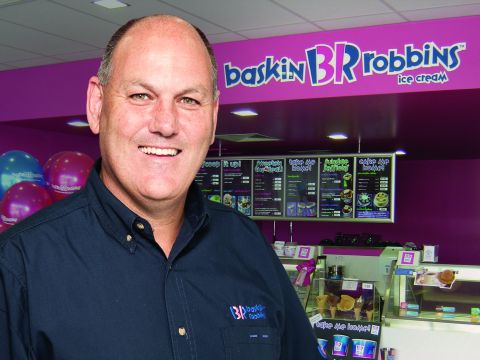
Baskin-Robbins is a good business and is only going to improve. That’s the prediction of Nigel Travis, CEO of Dunkin Brands, the American parent company which took back the Australian arm of Baskin-Robbins after the collapse of franchisor Allied Brands. Now the new management team put in place by Dunkin Brands is all set to sweeten the franchisees’ lot, promising a greater focus on service and support.
We have to ensure we don’t run before we can walk, but the US and Australia are pretty similar, says Travis, based in Boston and visiting Australia to discuss plans for the business with franchisees. The basic platform is comparable, a focus on great service, smiles, and customers tasting the products. It’s all about product and atmosphere, and how we sell them. We have put in senior management who are more than capable of running the business; our second job is to overcome some of the obstacles franchisees had in the latter days of Allied Brands ownership, he adds.
The supply chain has been improved, and new team members introduced at a direct level to support franchisees. One step to support the business is establishing franchise advisory councils. The Allied Brands management lacked a franchisee focus, Travis says. The franchise model is beautiful because the franchisee puts in their capital investment. The trick is to get franchisees to believe in it. We’ll continue to invest in support.
With head office located at a distant American east coast location it is vital to humanise the face of Baskin-Robbins in Australia, which is why there’s an Australian team led by general manager Ian Martin, and he is the face of the ice cream company here. The new management team has been given substantial authority and responsibility with the aim of getting standards right in operation skills, products and cleanliness, before turning to the sexier task of innovation.
We are very optimistic because Australia is the number three market in ice cream worldwide. There is no doubt this opportunity is enormous, Travis adds.
We have the heritage, flavour, fun and atmosphere. Once we have stabilised the business, we’ll be introducing innovations to evolve the business to something exciting. Going to ice cream stores should be exciting, for kids and families.
So what of the idea adopted not only by competitors in the franchising space, but by Allied Brands itself when it set Cookie Man outlets next to Baskin-Robbins: selling coffee alongside ice cream to counteract seasonal dips in sales? That’s an interesting concept, that’s the sort of innovation we might consider, says Travis.
With a portfolio of 87 stores the chain could reach several hundred across Australia; Travis says We have to be careful not to grow too fast, but we’re excited about Western Australia, Queensland, Sydney and New South Wales. All major cities here do well, they have good demographics and great weather.
Network growth will come through both existing and new franchisees and Australia’s position as a leading franchising nation can only enhance the expansion, Travis believes. The offer of a $10,000 discount of set-up costs for new franchisee stores signed-up through Travis’ express one-day showcase events around Australia is intended to kick-start initial growth. Additional marketing dollars brought in by multi-franchise units and new recruits to the Baskin-Robbins chain means there will be the budget to significantly boost the brand’s presence across the country.
What does stand out as a differential in US and Australian franchising is the proliferation of multi-unit franchisees, though that varies between the brands. For Baskin-Robbins in Australia the average store ownership is 1.1 per franchisee, in the US it’s 1.2. But at Dunkin’ Donuts the average store for each franchisee is a much greater 5.6.
In the US one Dunkin franchise has 227 stores. I’d like the average to go to seven or eight, says Travis, whose two year Australian target is an average Baskin-Robbins store count of two per franchisee. On his whistlestop tour Travis met some franchisees whose portfolios could easily double to six stores within a year, he predicts.
How to keep the franchisee happy
While Travis headed up the largest contingent of C-level executives from the US visiting the Baskin-Robbins business, the head of international division, Srinivas Kumar, has already been to Australia four times since the business was brought back to the Dunkin’ fold last year.
Says Travis, Our job is to support the franchisees. Our franchisees are in an incredibly positive mood; they’re very impressed with the marketing plan, and have seen changes to the business already.
The introduction of a marketing calendar, which includes a flavour of the month, gives franchisees a sales focus, and marketing webinars that share information and practical advice on how to tie in the brand’s marketing material at store level are already seeing a good franchisee attendance, says Australian operations manager, Brett Hannah.
The result, for the customer, is seeing a happier franchisee, Travis adds.
Of course for franchisees, the realities of better support from the franchisor will be most convincing when there are benefits to the bottom line. An improved supply chain that keeps franchisees well-stocked in product essentials, and offering lower prices for some dry-goods, provides an opportunity for franchisees to see increased revenue and a decrease in cost of goods.
The consistent message is that Baskin-Robbins’overall value of business is dependent on store level economics. Sensible store growth, franchisee profitability and great relationships are at the heart of the business, Travis believes.

